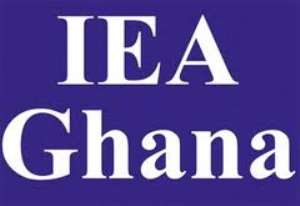
Accra, June 17, GNA – The Institute of Economic Affairs (IEA) at the weekend called for a review of the Ghana Statistical Services (GSS) methodology used in calculating inflation figures.
“GSS needs to review its system, especially if it is widely believed that the existing methodology is outdated and that it does not fully represent current expenditure patterns.”
Dr. J. K. Kwakye, IEA Senior Economist stated in a research document on: “Single-digit inflation and the cost of living dichotomy in Ghana,” made available to the Ghana News Agency in Accra.
In apparent defend of the GSS, in view of recent attack from a section of the public on its methodology in arriving at single-digit inflation rates, IEA said: “We do not expect that GSS would manipulate the data in order to achieve inflation figures that suit any particular constituency or constituencies, as that would be professionally unethical.
“We want to believe that GSS applies the same methodology all the time in calculating its inflation figures"
According to Dr Kwakye some people have tried to compare what they see to be much higher movements in the prices of some of the items in the Consumer Price Index (CPI) basket with the rate of inflation compiled by GSS and have argued that the GSS might be understating the true rate of inflation.
He said the way to validate GSS's inflation estimates would be to start from the raw data collected for the 242 items.
Current CPI Basket and Weights base year 2002 on 12 out of 242 items indicates that food and non-alcoholic beverages was rated 44.91per cent; alcoholic beverages, tobacco 2.23 per cent; clothing and footwear 11.29 per cent; housing, water, electricity, gas and others 6.98 per cent; and furnishings, household equipment 7.83 per cent.
The rest are health 4.33 per cent; transport 6.21 per cent; communications 0.31 per cent; recreation and culture 3.04 per cent; education 1.60 per cent; hotels, cafes and restaurants 8.28 per cent; and miscellaneous goods and services 2.99 per cent.
Dr Kwakye said the 12-item aggregated form of the CPI basket with the composite items and their relative weights, one can argue about what need to be in the basket and what need not be in as well as about the relative weights given to individual items.
“In fact, one may even go down to the entire 242 items in the CPI basket in making these arguments. The decision as to what has to change in terms of the individual items or their weights should be informed by the changing patterns of consumer spending in Ghana.
“For example, one may argue about the appropriateness of giving Communications a weight of only 0.31 per cent if it is believed that this does not truly represent its relative importance in consumers' spending,” he stated.
Dr Kwakye therefore suggested a constructive engagement with the GSS in a debate to bring about any deserved changes.
The GSS currently measures inflation by using a basket comprising 242 consumer goods and services. The base year for computing the inflation figures is 2002.
The GSS periodically collects price data on the 242 items. The primary data is collected mostly in non-standardized units, which are then standardized by GSS. The individual items in the CPI basket have weights based on the last consumer spending survey.
The weighted prices are converted into indices with 2002 as the base year. The average price index for all the 242 items is used to compute the rate of change of the index or inflation over a period of time—a month, quarter, or year—by comparing with previously-calculated indices.
GNA




 Akufo-Addo’s govt is the ‘biggest political scam’ in Ghana’s history – Mahama ja...
Akufo-Addo’s govt is the ‘biggest political scam’ in Ghana’s history – Mahama ja...
 Performance Tracker is not evidence-based — Mahama
Performance Tracker is not evidence-based — Mahama
 Four arrested for allegedly stealing EC laptops caged
Four arrested for allegedly stealing EC laptops caged
 $360 million IMF bailout not enough for Ghana – UGBS Professor
$360 million IMF bailout not enough for Ghana – UGBS Professor
 Shrinking Penis Allegations: Victim referred to trauma hospital due to severity ...
Shrinking Penis Allegations: Victim referred to trauma hospital due to severity ...
 Adu Boahen Murder: Case adjourned to May 9
Adu Boahen Murder: Case adjourned to May 9
 ‘I've health issues so I want to leave quietly and endure my pain’ — Joe Wise ex...
‘I've health issues so I want to leave quietly and endure my pain’ — Joe Wise ex...
 Let’s help seek second independence for Ghana before NPP sells the country – Law...
Let’s help seek second independence for Ghana before NPP sells the country – Law...
 New Force aims to redeem Ghana and West Africa — Nana Kwame Bediako
New Force aims to redeem Ghana and West Africa — Nana Kwame Bediako
 ‘I didn't say I would buy Ghana if voted against; I said I’ll buy it back from f...
‘I didn't say I would buy Ghana if voted against; I said I’ll buy it back from f...
